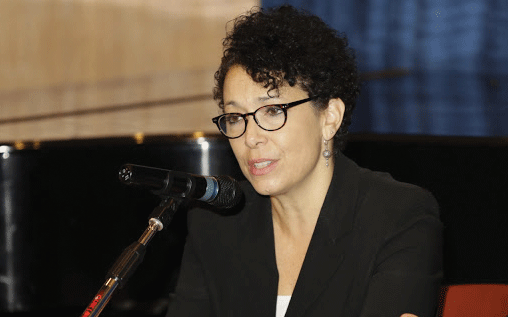Klein-Solomon on Modern Migrancy

Klein-Solomon reflects on migrancy in the modern day: a pertinent political issue.
Wednesday March 8, Senior Policy Migration Advisor to the Director General at the headquarters of the International Organization for Migration (IOM) Michele Klein-Solomon ’83 spoke to Colgate students about migration and its national and global effects. Klein-Solomon first defined the word “migrant” as an individual who has lived outside his or her home country of origin for more than one year.
Today, there are 244 million migrants, making up 3.3% of the global population. Additionally, of this 244 million, 50% are women who are migrating as the heads of households rather than following a spouse.
Klein-Solomon reiterated that migration is an incredible opportunity and often is a means to acquire safety. Thus, one of the main goals of the IOM is to enhance the positive aspects of migration in order to promote social cohesion. Klein outlined three major aspects that are crucial to migration and its future: sovereignty, mobility and governance.
State sovereignty is fundamental to migrants’ lives, as the state determines who may stay and who must leave. A state’s first priority is to protect its citizens; thus, migrants may not always take priority on the state’s agenda.
Additionally, Klein-Solomon discussed refugees place in the state. She defined a “refugee” as one who moves outside home country due to fear of persecution, usually from the government. Furthermore, the international community has the responsibility to assist and take in refugees. Klein-Solomon added that historically, the United States has been one of the most generous countries in the number of refugees it has taken in.
Klein-Solomon also discussed the role of mobility in migration. She emphasized that mobility has become more important as transportation and communication, refugee numbers and natural disasters have increased, giving individuals more reason to move. Klein-Solomon also said that mobility has provided prosperity.
“Many countries rich in population have said their people are their advantage,” Klein-Solomon said.
She shared that countries and companies have access to gaining the best and brightest individuals throughout the world through mobility, which makes it appealing for many countries.
Lastly, Klein-Solomon addressed governance. Klein-Solomon said that many individuals find issues with migration. She discussed the many negative undertones related to migration, such as seeing migrants as “the other” and a threat to security.
“Countries often share a perception that migration is out of control and that migrants seek to take away benefits from citizens,” Klein-Solomon said.
However, Klein-Solomon offered ideas for a better system that is more accepting of migrants and suited to migration.
“Migration is addressed by politicians who operate in a cycle in short term and is responsive to only the electorate, which does not focus on long term goals and a humanitarian perspective,” Klein-Solomon said.
Klein-Solomon also emphasized the need for a system that is flexible and adaptive to “changing needs” in order to foster the future of migration.
Sophomore Rachel Smith attended Klein-Solomon’s lecture, as she will be studying on the 2018 Colgate Geneva Study Group and is interested in international politics and affairs both regarding the United States and other countries.
“I found it very interesting to think about migration as the simple act of moving and the great impact that act has had on our global community. I hope to learn more about migration in the future and particularly next year in Geneva,” Smith said.






